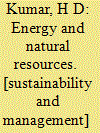|
|
|
Sort Order |
|
|
|
Items / Page
|
|
|
|
|
|
|
| Srl | Item |
| 1 |
ID:
116953


|
|
|
|
|
| Publication |
Kolkata, CSIRD, 2006.
|
| Description |
69p.pbk
|
|
|
|
|
|
|
|
|
|
|
|
Copies: C:1/I:0,R:0,Q:0
Circulation
| Accession# | Call# | Current Location | Status | Policy | Location |
| 057026 | 382.952059/KHA 057026 | Main | On Shelf | General | |
|
|
|
|
| 2 |
ID:
122813


|
|
|
| 3 |
ID:
042392


|
|
|
|
|
| Publication |
New York, Schocken books, 1974.
|
| Series |
vp.
|
|
|
|
|
|
|
|
|
|
|
|
Copies: C:1/I:0,R:0,Q:0
Circulation
| Accession# | Call# | Current Location | Status | Policy | Location |
| 013363 | 333.79/SZC 013363 | Main | On Shelf | General | |
|
|
|
|
| 4 |
ID:
081840


|
|
|
|
|
| Publication |
New Delhi, Vitasta Publishing Pvt td, 2008.
|
| Description |
xix, 619p.
|
| Standard Number |
9788189766795
|
|
|
|
|
|
|
|
|
|
|
|
Copies: C:1/I:0,R:0,Q:0
Circulation
| Accession# | Call# | Current Location | Status | Policy | Location |
| 053505 | 333.7/KUM 053505 | Main | On Shelf | General | |
|
|
|
|
| 5 |
ID:
171516


|
|
|
|
|
| Summary/Abstract |
Successful electrification of cities' heating and cooling demands depends on the sustainable implementation of highly efficient ground source heat pumps (GSHP). During the last decade, the use of shallow geothermal energy (SGE) resources in urban areas has experienced an unprecedented boost which nowadays is still showing a steady 9% market growth trend. However, the intensive market incorporation experienced by this technology entails different responsibilities towards the long-term technical and environmental sustainability in order to maintain this positive trend. Here we present a SGE management framework structure and a governance model agreed among 13 European Geological Surveys, providing a roadmap for the different levels of management development, adaptable to any urban scale, and independent of the hydrogeological conditions and the grade of development of SGE technology implementation. The management approach reported is based on the adaptive management concept, thus offering a working flow for the non-linear relationship between planning, implementation and control that establishes a cyclical and iterative management process. The generalized structure of the SGE management framework provided allows the effective analysis of policy to identify and plan for management problems and to select the best management objectives, strategies and measures according to the policy principles proposed here.
|
|
|
|
|
|
|
|
|
|
|
|
|
|
|
|
| 6 |
ID:
177122


|
|
|
|
|
| Summary/Abstract |
The paper reviews the current and future state of renewable energy (RE) utilization in the Gulf Cooperation Council (GCC) countries and explores each country's potential in harnessing RE. It highlights on the social, political, and economic factors that drive these countries towards RE adoption. The paper shows that while some countries in the GCC are striding ahead in RE installations, others are lagging as their current RE capacities are not at par with the global capacities. The paper lays out the RE goals of each GCC country and explores the scope, methods, and feasibility of generating energy from solar and wind resources. The paper also shows how GCC countries can achieve their 2030 RE goals by proactively utilizing their abundant RE reserves. Furthermore, it attempts to draw a comparison on each GCC country's currently installed RE capacity, the capacity based on RE project pipelines, and the capacity estimates of each country in 2030 based on International Renewable Energy Agency (IRENA) projections. The paper provides a broad view on the possibilities, factorable stances, and projections for RE adoption to benefit policymakers.
|
|
|
|
|
|
|
|
|
|
|
|
|
|
|
|
| 7 |
ID:
191399


|
|
|
|
|
| Summary/Abstract |
In recent years, the increasing popularity of renewable energy and energy-efficient technologies is creating a new movement towards more sustainable communities. Understanding energy consumption is important for the optimisation of resources and the implementation of ecological trends. This paper integrates electricity consumers into a cooperative framework for planning sustainable smart communities through aggregators, which reallocates consumers’ demand according to available renewable energy supply collected from consumers and service providers. The aggregated demand response also includes consumers involved in energy production activities through microgeneration capabilities. A characterisation study of the different types of demand preferences is performed by defining scenarios of communities and consumers’ behaviours, which are validated through a reputation factor. The results show that the system adequately manages demand reallocation following the preferences and contribution of consumers and/or prosumers. Besides, this research analyses the current energy policy concerning demand flexibility, demand aggregation and microgeneration capacity, and their regulations in Spain. Finally, microgeneration acceptance, the role of aggregators and prosumers in the scheduling process is also investigated through a series of surveys.
|
|
|
|
|
|
|
|
|
|
|
|
|
|
|
|
|
|
|
|
|